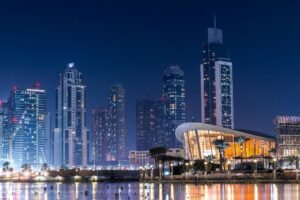The Borneo Rainforest, a UNESCO World Heritage site, is one of the world’s most biodiverse ecosystems. Stretching across the Malaysian states of Sabah and Sarawak, as well as the Indonesian part of Borneo, it is home to an extraordinary variety of flora and fauna, including rare species like the orangutan, pygmy elephant, and proboscis monkey. Its vast canopies and intricate ecosystems provide essential services to the planet, including carbon storage, oxygen production, and climate regulation.
With its increasing popularity as a travel destination, responsible tourism is more important than ever. To preserve this irreplaceable natural treasure for future generations, it’s crucial for visitors to adopt eco-friendly practices while exploring the Borneo rainforest.
Here’s a guide on how to visit Borneo’s rainforests responsibly, ensuring your adventure has minimal environmental impact.
1. Choose Eco-Friendly Tours and Accommodations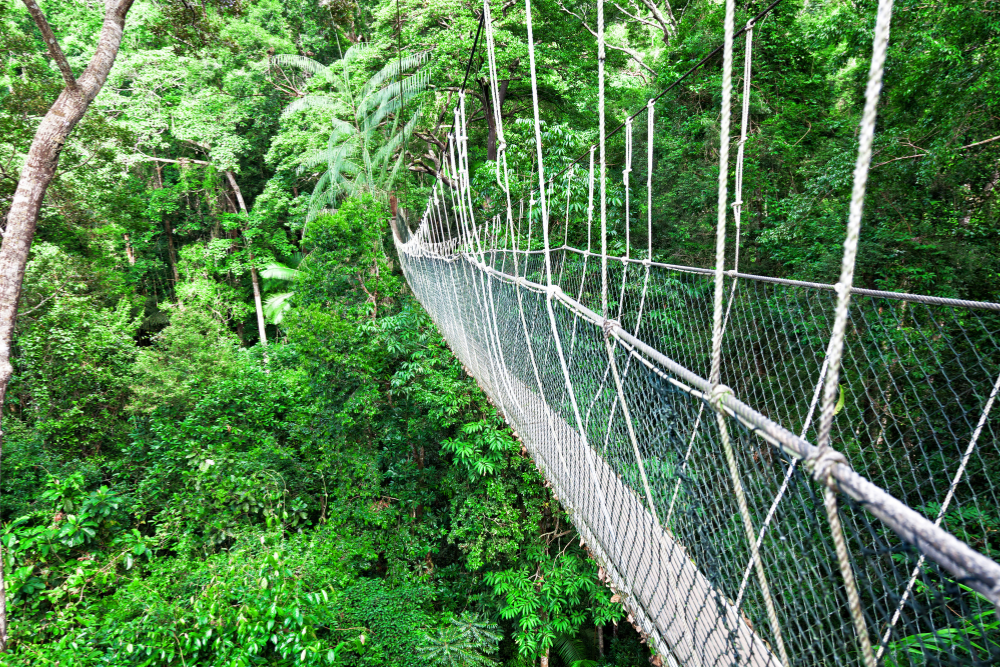
One of the most important steps in responsible rainforest tourism is selecting operators who prioritize sustainability. When looking for tours or places to stay, choose those that adhere to eco-tourism principles.
- Eco-Tour Operators: Seek companies that are committed to minimizing their environmental footprint. These companies often practice “Leave No Trace” principles, use locally sourced materials, and educate visitors about environmental protection.
- Certified Accommodations: Opt for eco-lodges or hotels that practice sustainable tourism, such as using solar power, reducing waste, and supporting local communities. Many rainforest accommodations are built with low environmental impact in mind, using materials that blend in with the surroundings and conserve energy.
Pro Tip: Look for establishments that have received certifications like Green Key or EarthCheck, which indicate a commitment to environmental stewardship.
2. Stick to Designated Trails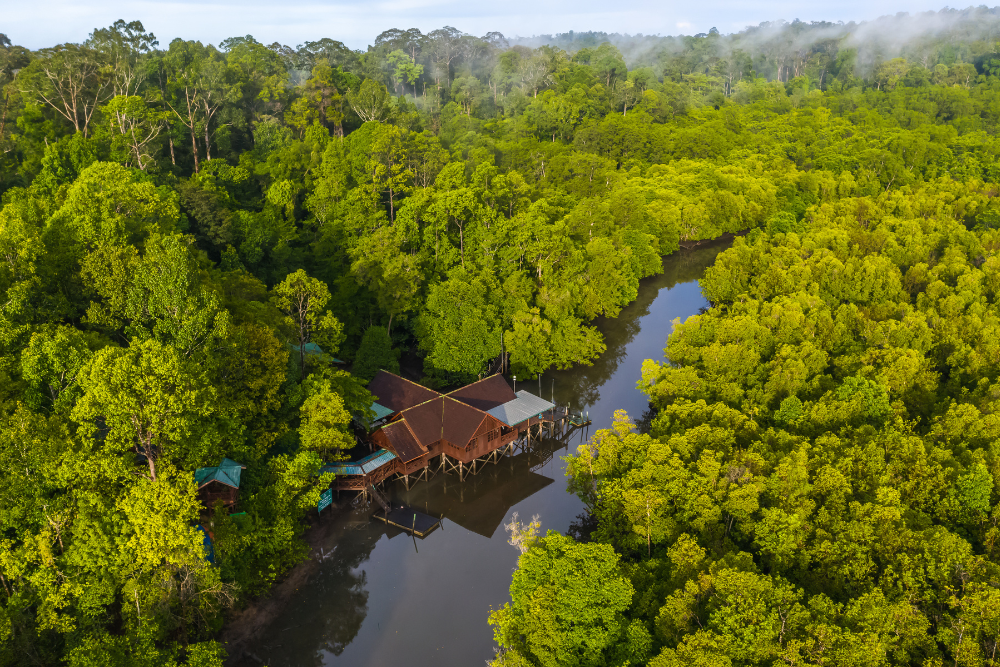
The Borneo rainforest is a delicate environment, and it’s important to respect the natural pathways and wildlife habitats when trekking. Staying on designated trails minimizes the damage to the ecosystem and reduces the risk of disturbing wildlife.
- Hiking Trails: Whether you’re exploring Danum Valley, Kinabatangan River, or Mulu National Park, always follow marked trails. Straying off the path can damage plant life, disrupt animal habitats, and even increase the risk of getting lost.
- Guided Tours: Engage local guides who understand the delicate balance of the rainforest ecosystem. These guides can lead you along the safest, most sustainable routes while educating you about the biodiversity you’re witnessing.
3. Respect Wildlife and Keep a Safe Distance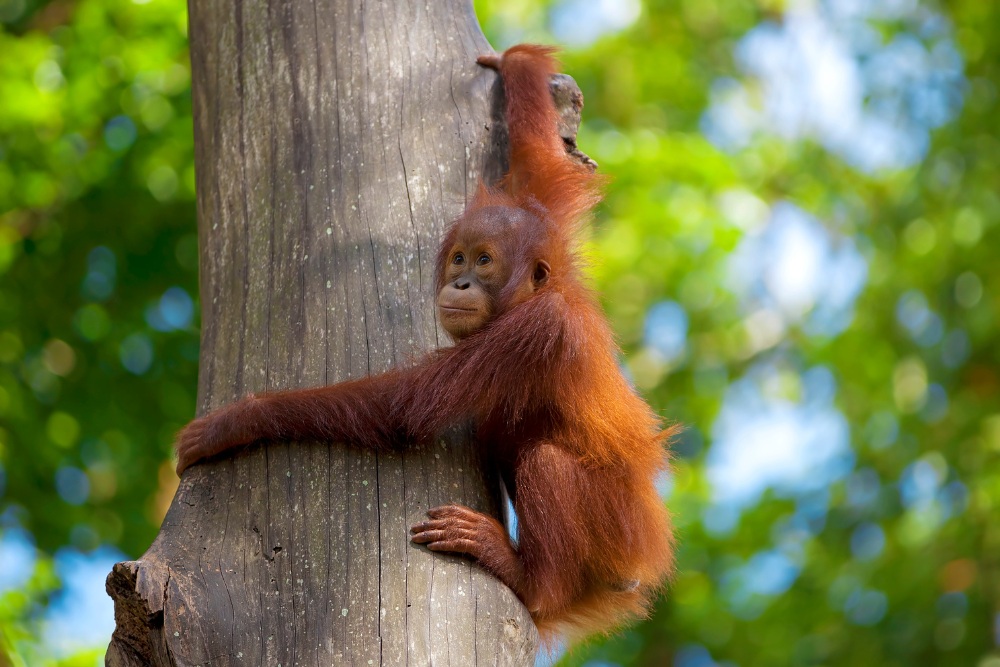
Borneo’s wildlife is one of its greatest attractions, but it’s crucial to maintain respect and keep a safe distance from animals, whether they’re orangutans, pygmy elephants, or other endangered species. Human presence can stress animals, disrupt their natural behavior, and even lead to dangerous interactions.
- Photography: While it’s tempting to snap a photo, ensure that you don’t disturb wildlife while doing so. Avoid using flash photography, as it can startle animals, and always ask your guide for advice on the best way to approach and observe wildlife.
- Do Not Feed Animals: Feeding wildlife can cause them to become dependent on humans for food, alter their natural diets, and make them more vulnerable to poachers. Let them forage and live naturally.
4. Reduce Waste and Leave No Trace
One of the most fundamental principles of responsible travel is minimizing waste and leaving no trace of your visit. This is especially important in the rainforest, where litter can remain for years and harm both plants and animals.
- Pack Light, Pack Smart: Bring reusable water bottles, eco-friendly toiletries, and biodegradable soap. Avoid plastic packaging, as plastic waste can accumulate and pollute the ecosystem.
- Dispose of Waste Properly: Carry all trash with you, even if it’s biodegradable. Organic waste such as fruit peels or paper still takes time to decompose and can attract wildlife that may be harmed by human food waste.
- Use Eco-Friendly Products: Choose products that are non-toxic and biodegradable, especially if you plan to bathe in natural rivers or streams. Harsh chemicals can harm the delicate ecosystem of the rainforest.
5. Avoid Using Fossil Fuels and Carbon-Heavy Transportation
The environmental impact of travel isn’t just limited to activities in the destination; getting there can also contribute to carbon emissions. To minimize your carbon footprint:
- Choose Sustainable Transportation: Opt for buses or trains over flights when possible. If flying is necessary, look for airlines that have carbon-offset programs or commit to reducing their carbon emissions.
- Eco-Friendly Transfers: Once in Borneo, consider using public transportation or low-emission vehicles when traveling to the rainforest. Many eco-tour operators offer electric or hybrid vehicles to reduce the environmental impact of local travel.
6. Contribute to Conservation Efforts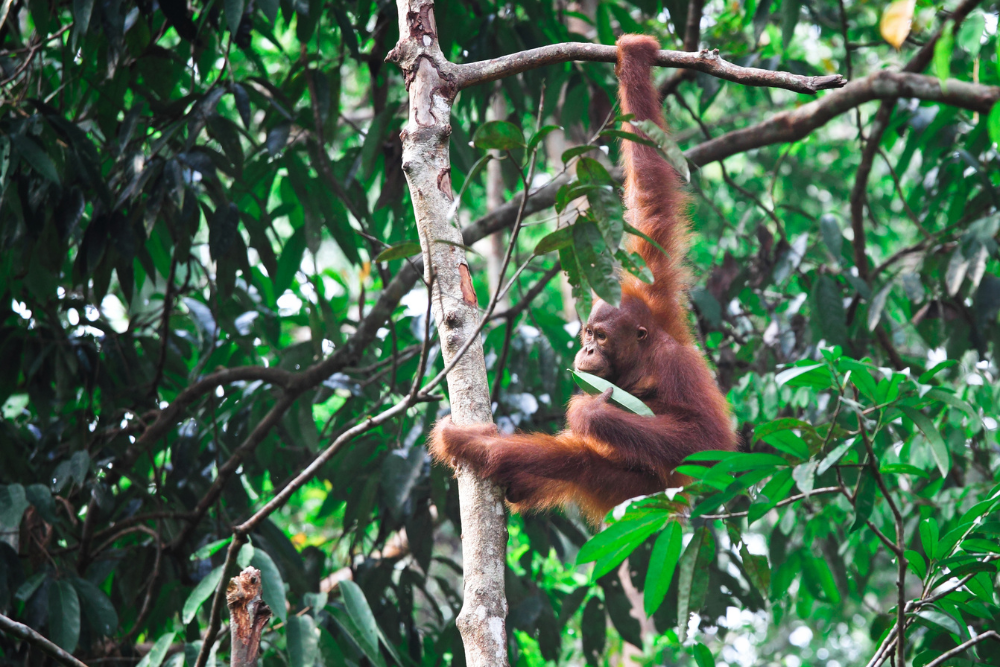
Many regions in Borneo have been impacted by deforestation and habitat destruction, often caused by palm oil plantations and illegal logging. As a responsible traveler, you can support local conservation efforts in a variety of ways.
- Donation to Conservation Projects: Consider donating to organizations dedicated to protecting the rainforest and its wildlife, such as The Orangutan Foundation International or Borneo Conservation Trust.
- Support Local Communities: Many local indigenous groups rely on sustainable rainforest practices for their livelihoods. By supporting their crafts, products, and services, you contribute to both cultural preservation and environmental conservation.
7. Avoid Products That Contribute to Deforestation
One of the main drivers of deforestation in Borneo is the demand for palm oil, which is found in many everyday products. As a conscious traveler, you can make a difference by avoiding items that contribute to the destruction of rainforests.
- Be Palm Oil Aware: Look for products labeled as RSPO-certified (Roundtable on Sustainable Palm Oil), which indicates that palm oil was sourced responsibly without contributing to deforestation.
- Support Sustainable Tourism Initiatives: Choose businesses that prioritize sustainable sourcing of materials and collaborate with organizations that protect the environment. Many eco-lodges and tour operators in Borneo support initiatives to combat deforestation and wildlife trafficking.
8. Be Mindful of Noise Pollution
Rainforests are sensitive environments, and excessive noise can disrupt animal behavior and disturb their natural patterns. While you’re out exploring, remember to maintain a quiet presence to avoid startling wildlife.
- Quiet Exploration: Keep your voice low and avoid loud noises, which can disturb both animals and fellow travelers. Speak in hushed tones when near sensitive wildlife habitats.
- Electronic Devices: Limit the use of electronic devices that emit noise, such as radios or phones, in the rainforest.
9. Be Educated and Spread Awareness
Education is key to sustainable tourism. The more you know about the Borneo rainforest, the more you’ll understand the importance of protecting it. Share your experiences and the knowledge you gain with others to encourage responsible travel behavior.
- Learn About the Rainforest: Take the time to educate yourself about the local flora and fauna, the environmental challenges the region faces, and the ongoing conservation efforts.
- Advocate for Sustainability: Encourage other travelers to respect the rainforest and its ecosystems by sharing eco-friendly practices, highlighting the importance of sustainability, and supporting local conservation initiatives.
10. Participate in Volunteering or Restoration Programs
If you’re looking to make a more hands-on contribution, consider joining a volunteer program focused on rainforest restoration or wildlife conservation in Borneo. Many organizations offer programs where you can work alongside local communities and scientists to restore habitats or protect endangered species.
Conclusion: A Responsible Adventure in the Borneo Rainforest
Visiting the Borneo Rainforest is an extraordinary experience that connects travelers with one of the planet’s most vital ecosystems. By adopting sustainable practices—such as choosing eco-friendly tours, respecting wildlife, reducing waste, and supporting local conservation efforts—you can help preserve the natural beauty of Borneo while still enjoying its wonders.
Responsible tourism isn’t just about protecting the environment; it’s about ensuring that future generations will have the chance to experience the magic of the Borneo Rainforest just as you did.











